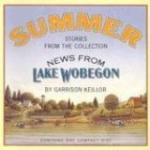“During the year that he worked at his trade upon the shores of Lake Erie, we saw him more frequently; but the visit that I remember with the greatest pleasure was one that he made us just after establishing his New Yorker. I was much impressed during this last visit with a marked change in brother’s taste and character—a change indicated as much by his reading as by his external appearance. His trunk was now filled with standard works and volumes of poems, instead of treatises upon science, and he appeared in a perpetual rose-dream. He seemed to me the embodiment of romance and poesy, and now as I think of him with his pure, unselfish nature, so early devoted to what was noblest and best, I can only compare him to the high-minded boy-saint, the chaste, seraphic Aloysius.
“It was while at home this time that he wrote his poem ’The Faded Stars,’ that was published in the New Yorker, and copied into several leading journals—”
“Oh, I am so fond of that poem,” interrupted Ida, “that I have copied it into my album of poetical selections. Papa wrote it, you say, while visiting you?”
“Yes, he wrote it in the room where the family were all assembled. I recollect sitting beside him and watching his face as line after line flowed from his pen. I had never before seen any one write a poem, and it seemed to me quite wonderful. Read it to me, Ida, if your album is at hand; I do not recollect all the stanzas.”
“THE FADED STARS.”
BY HORACE GREELEY.
I
“I mind the time when Heaven’s
high dome
Woke in my soul a wondrous
thrill—
When every leaf in Nature’s tome
Bespoke Creation’s marvels
still;
When morn unclosed her rosy bars,
Woke joys intense; but naught
e’er bade
My soul leap up like ye bright stars!
[1]
II.
“Calm ministrants to God’s
high glory!
Pure gems around His burning
throne!
Mute watchers o’er man’s strange,
sad story
Of crime and woe through ages
gone!
’Twas yours, the wild and hallowing
spell,
That lured me from ignoble
glens—
Taught me where sweeter fountains
Than ever bless the worldling’s
dreams.
III.




